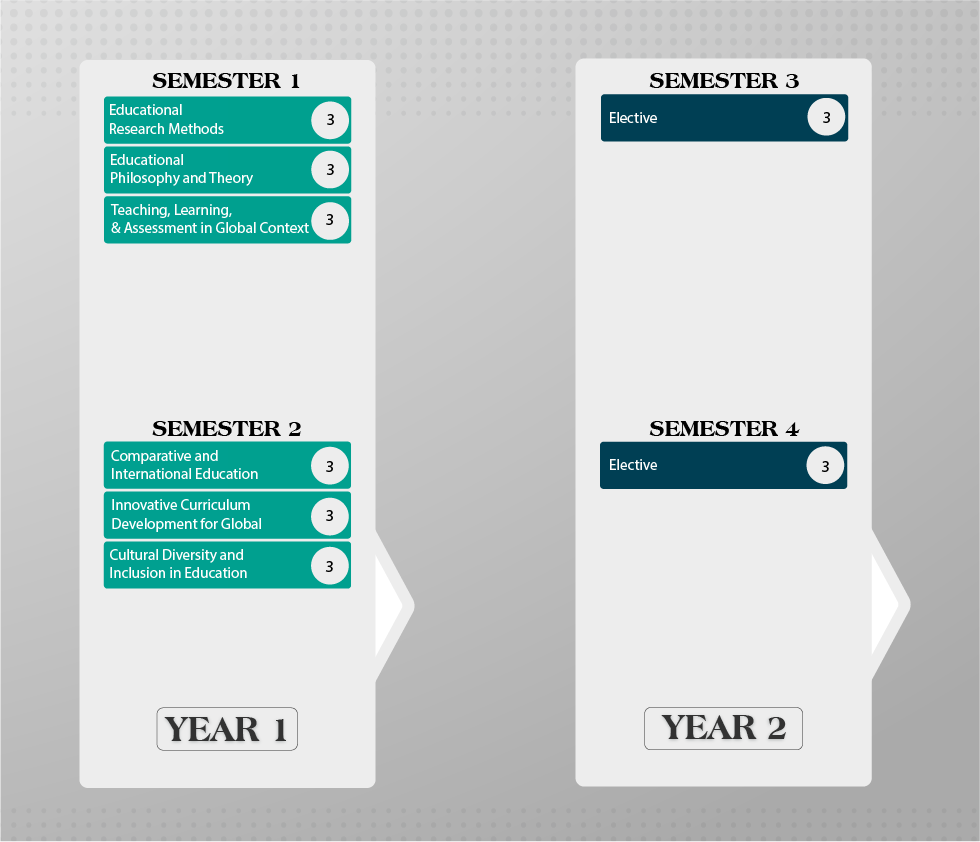Post Graduate Diploma in Education
Overview
The Post Graduate Diploma in Education (PGDE) at the American University in the Emirates (AUE) is a one-year intensive program designed for individuals who hold a bachelor’s degree in any field and aspire to become qualified educators. The PGDE provides a strong foundation in pedagogical theory, instructional methods, and classroom management, enabling career-changers and aspiring teachers to transition effectively into the teaching profession.
Combining academic rigor with practical field experience, the program equips students with the essential skills to plan, deliver, and assess high-quality learning experiences. With a focus on 21st-century teaching competencies, the PGDE promotes reflective practice and ethical leadership in diverse educational settings.
What Makes Our Program Unique
- Professional Teaching Qualification: Offers a pathway for non-education graduates to enter the teaching profession with internationally aligned standards.
- Practical Training in Real Classrooms: Includes a supervised teaching practicum in local schools to apply theory in authentic settings.
- Compact, Career-Focused Curriculum: The one-year structure is ideal for individuals seeking a fast-track entry into the education field.
- Expert Faculty & Industry Links: Students benefit from mentorship by experienced educators and connections with leading schools in the UAE.
Who Should Join This Program
- Bachelor’s degree holders in any discipline seeking a recognized teaching qualification.
- Aspiring teachers aiming to work in public or private K–12 schools.
- Education professionals in support roles (e.g., teaching assistants, coordinators) who wish to formalize their teaching credentials.
- Professionals transitioning into education from other sectors.
1: Instill in students a thorough awareness of and comprehension of International trends in education to help them develop the critical thinking and international system comparison skills necessary for success.
2: Empower students to practice inclusive teaching strategies that honor cultural diversity and guarantee fair educational opportunities for every student.
3: Inspire students to create innovative curricula by including multicultural content, International viewpoints, and a knowledge of various teaching methodologies.
4: Equip students with the tools they need to use data wisely in order to make decisions in the classroom, encouraging ongoing development and evidence-based approaches.
5: Develop leadership abilities that will empower graduates to drive change, encourage teamwork, and overcome obstacles in multicultural learning contexts.
1. Acquire a comprehensive knowledge of international education systems to examine different models, highlighting unique characteristics and challenges.
2. Compare various international educational systems to identify key elements of international competence in curriculum design, and to construct curriculum frameworks that are culturally responsive and inclusive, integrating international perspectives and multicultural content.
3. Formulate approaches for incorporating Artificial Intelligence tools and techniques in an educational context to enhance learning experience and to predict future AI development in educational field.
4. Implement teaching strategies that are inclusive and responsive to diverse cultural needs, promoting a culture of continuous learning and improvement within educational settings.
5. Apply advanced research methodologies to effectively identify, critique, and address educational challenges and best practices in the educational landscape.
Graduates of the PGDE program can pursue positions such as:
- Licensed K–12 School Teacher (subject to local licensure requirements)
- Teaching Assistant or Classroom Support Specialist
- School Administrator (with further experience)
- Curriculum Developer (entry level)
- Education Program Coordinator
- International School Teacher
Fee Structure
Fall 2025-26
PROGRAM STRUCTURE
Course Category
Total Number of Courses
Total Number of Credit Hours
Core Courses
6
18
Elective Courses
2
6
Total
24 Credit Hours
PROGRAM Courses
CORE COURSES
6 COURSES | 18 CREDIT HOURS
Elective Courses
CHOOSE 2 COURSES | 6 CREDIT HOURS
This course offers an extensive exploration of international education policies and how they are created and put into action globally. Students will explore how international organizations along with governments and non-governmental organizations play a part in shaping policies. The focus of the class is on comparing and analyzing educational policies, discussing the challenges faced in transferring policies from one context to another and understanding how global trends in education impact national education systems.
This course navigates into leadership theories and change management strategies within the context of global education. It aims to develop leadership skills that are effective in diverse cultural settings. The course thoroughly examines strategies for leading and managing change in educational institutions, addressing global leadership challenges, effective communication across cultures, and practical techniques for implementing change. This course is pivotal for educational leaders aiming to navigate and influence the evolving global educational landscape effectively.
The course explores transforming educational institutions into dynamic entities. It expands upon the idea of how these organizations can evolve to be more responsive, creative, and perpetually enhance their teaching and administrative environments. The course rigorously examines various models and frameworks that define a learning organization, emphasizing the role of leadership in cultivating a culture that embraces change and innovation. It also explores how organizational culture and leadership practices can significantly influence learning outcomes and the effectiveness of educational practices. Furthermore, it provides practical insights into planning and implementing strategies that encourage ongoing development and growth within educational environments, making it an essential component for educators and administrators aiming to lead in the evolving landscape of global education.
The course explores the Artificial Intelligence (AI) fundamentals and its diverse applications in enhancing teaching, learning, and educational management. The course offers understanding of the theoretical foundation of AI in education, current applications of AI in education, advanced teaching, learning, and assessment AI tools, and the management of educational systems. Students will critically analyze ethical considerations, navigate the challenges of AI integration in education, and predict AI’s future potential and impact on the educational landscape.


